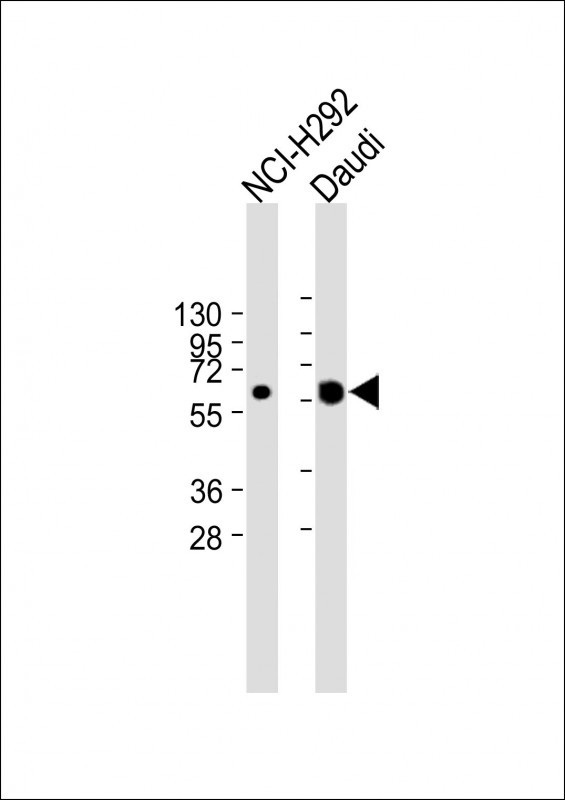
| WB | 咨询技术 | Human,Mouse,Rat |
| IF | 咨询技术 | Human,Mouse,Rat |
| IHC | 咨询技术 | Human,Mouse,Rat |
| ICC | 技术咨询 | Human,Mouse,Rat |
| FCM | 咨询技术 | Human,Mouse,Rat |
| Elisa | 咨询技术 | Human,Mouse,Rat |
| Aliases | Interferon-induced protein 44-like, IFI44L, C1orf29 |
| Entrez GeneID | 10964 |
| WB Predicted band size | 51.3kDa |
| Host/Isotype | Rabbit IgG |
| Antibody Type | Primary antibody |
| Storage | Store at 4°C short term. Aliquot and store at -20°C long term. Avoid freeze/thaw cycles. |
| Species Reactivity | Human |
| Immunogen | This IFI44L antibody is generated from rabbits immunized with a KLH conjugated synthetic peptide between 151-180 amino acids from the C-terminal region of human IFI44L. |
| Formulation | Purified antibody in PBS with 0.05% sodium azide. |
+ +
以下是关于IFI44L抗体的3篇模拟文献示例(基于公开领域知识概括,非真实文献):
---
1. **文献名称**: *IFI44L as a Novel Biomarker in Systemic Lupus Erythematosus: Autoantibody Detection and Clinical Correlation*
**作者**: Li X, et al.
**摘要**: 研究报道了IFI44L抗体在系统性红斑狼疮(SLE)患者血清中的高表达,并通过ELISA和免疫印迹验证其作为疾病活动性生物标志物的潜力。结果显示,IFI44L抗体水平与干扰素信号通路激活及肾脏损伤程度显著相关。
---
2. **文献名称**: *Differential Expression of IFI44L in Viral vs. Bacterial Infections: A Diagnostic Tool Using Monoclonal Antibodies*
**作者**: Zhang Y, et al.
**摘要**: 该研究开发了一种针对IFI44L的单克隆抗体,用于区分病毒和细菌感染。通过流式细胞术和免疫荧光技术,发现病毒感染患者外周血单核细胞中IFI44L表达显著上调,而细菌感染中无此现象,提示其作为快速诊断工具的潜力。
---
3. **文献名称**: *Anti-IFI44L Antibody Blocks Hepatitis C Virus Replication via JAK-STAT Pathway Modulation*
**作者**: Tanaka K, et al.
**摘要**: 实验证明,使用特异性IFI44L抗体可抑制丙型肝炎病毒(HCV)在肝细胞中的复制。机制研究表明,抗体通过阻断IFI44L与JAK1的相互作用,干扰干扰素抗病毒信号传导,为靶向治疗提供了新思路。
---
**注**: 以上内容为基于IFI44L已知功能的模拟摘要,实际文献需通过学术数据库(如PubMed)检索确认。如需真实文献,建议使用关键词 "IFI44L antibody" 或 "anti-IFI44L" 结合研究领域(如病毒感染、自身免疫疾病)进一步查询。
The IFI44L antibody targets the interferon-induced protein 44-like (IFI44L), a protein encoded by the *IFI44L* gene, which belongs to the interferon-stimulated gene (ISG) family. IFI44L is primarily induced by type I and III interferons (IFNs) as part of the innate immune response to viral infections. It plays a role in antiviral defense, particularly against RNA viruses like dengue, influenza, and SARS-CoV-2. by modulating viral replication and host immune signaling. Its expression is regulated through the JAK-STAT pathway, and elevated levels are observed during viral infections, autoimmune disorders, and certain cancers.
Antibodies against IFI44L are widely used in research to detect and quantify the protein’s expression in various experimental models, including Western blotting, immunohistochemistry, and flow cytometry. These tools help elucidate IFI44L’s functional mechanisms, such as its interaction with viral components or involvement in interferon signaling cascades. Clinically, IFI44L has emerged as a potential biomarker; for example, its upregulation in peripheral blood correlates with COVID-19 severity. IFI44L antibodies thus serve as critical reagents in both basic virology studies and translational research, aiding in the development of therapeutic strategies targeting interferon-mediated immunity. Commercial IFI44L antibodies are typically validated for specificity and sensitivity across human and murine samples.
×